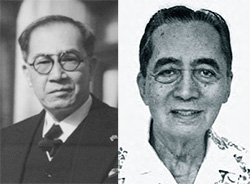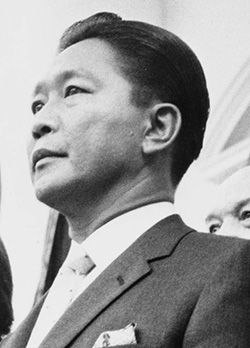Epic rap battles of the Philippine legislature
1. Claro M. Recto vs. Quezon, Osmeña, and Roxas
MANILA, Philippines - The issue: “The Fairfield Bill”
The problem: Independence was an obvious desire for many Filipinos under the American rule. The only people who didn’t want independence, ironically, were the politicians themselves — Quezon, Osmeña, and Roxas. “The Fairfield Bill” was filed in US Congress in 1922; it was a compromise measure to further delay independence, and it was supported by the three of them. “Why should we bite the hand that fed us?” they thought. Likewise, it was a competition of “Who brought the best bill?” — a race to acquire the most favorable terms for independence: the winner would most probably win the highest political position. Congressman Recto would argue with the three of them for eight hours straight in Congress, making allegations of national treachery.
The result: The Philippines (after two decades) was still rewarded independence through other bills and means. However, there were still plenty of restrictions on trade, which were favorable for the Americans. This cemented the type of politicians we have now: politicians who can’t think beyond themselves. Politics, from that point on, always had that footnote of “What’s in it for me?”
2. Senators Jose P. Laurel and Claro M. Recto vs. Senators Francisco Soc Rodrigo, Mariano Jesus Cuenco, and Decoroso Rosales
The issue: The Rizal Law
The problem: “The Rizal Bill” was going to place the study of Jose Rizal’s Noli Me Tangere and El Filibusterismo at the core of its educational program. The ones who authored the bill — Senators Claro M. Recto and Jose P. Laurel — were adamant in pushing for a censor-free reading of the book. However, Senators Soc Rodrigo, Mariano Cuenco, and Decoroso Rosales were against this and were backed by a strong and conservative Church bloc. They argued on whether or not the teaching of Rizal’s books would violate a person’s right to religion and freedom of conscience. The debates heated up, with both sides going on long monologues tackling the issues of heroism, nationalism, identity, religion, and morality.
The result: “The Rizal Bill” was passed. PI 100 (or its derivations) is now a required subject. The Noli and El Fili are being taught at the high school level. And statues of Rizal are all over the country. Tough luck for the Church, the stereotype of a bad priest stuck with Filipinos, even if Jose Rizal included Padre Florentino and other frailes who did well in the novel.
 3. President Roxas vs. the opposition in Congress
3. President Roxas vs. the opposition in Congress
The issue: US Bases
The problem: When the Philippines was granted independence, the Bell Trade Act was put forward by the Americans in 1946. It was aimed at giving Americans full rights to the ownership of land and business enterprises in the Philippines. This piece of legislation came hand in hand with the Mutual Defense Treaty (the Enhanced Defense Cooperation Agreement’s granddaddy) and the Military Assistance Pact. This was met with opposition in Congress — what use was their hard-fought independence if the Americans were going to be treated as first class citizens and Filipinos were going to be kept as mere pawns?
The result: Since there was absolutely no way these laws could make it through Congress, President Roxas filed trumped-up charges against several opposition congressmen. The congressmen were ejected from their positions, ultimately changing the number of the majority. This led to Congress passing the bill. Sounds familiar, eh? EDCA remains a problem today — more than half a century since.
4. President Marcos vs. Nacionalista Party in Congress
The issue: Decontrol measures
The problem: Martial law was yet to be implemented and private companies remained at the mercy of the government. High taxes, laws that hindered complete free trade, and restrictive tariff provisions that had been at play since the Americans invaded the Philippines, were still being implemented. These effectively limited the private corporations from growing too large for the government to handle. At the same time, it kept the revenues for the government alive. President Marcos, however, wanted to loosen the government’s control measures. He argued that this would be for the greater good — that if these private corporations were left on their own, they would foster wholesome economic growth. He was, however, met with rampant opposition in the Senate and in Congress. They knew that it would cripple the government in ways like never before.
The result: Massive decontrol resulted in the reduction of revenues for the government. Marcos won the argument when he was elected president for a second term — with a slogan promising fewer taxes — but he would be quick to renege on his word. He loaned lump sums from the World Bank and other multinational lending institutions to fund his struggling administration. Eventually, when he could hardly control the situation, he declared martial law — funneling all power to himself. For all valid concerns and vigorous academic discussion, he could have ended all debate by saying, “What decontrol measures?”
 5. Jejomar Binay vs. Antonio Trillanes
5. Jejomar Binay vs. Antonio Trillanes
The issue: Corruption? Delicadeza? Uh, the 2016 elections?
The problem: There are allegations of Binay harboring too much wealth, that he has systematically stolen money from the people’s taxes. Having been elbowed by his infamous convoy more than a dozen times, I don’t doubt that he and his family are power-hungry creeps in a thousand other ways. But at the same time, there’s Senator Trillanes who’s promoting a fight and fighting it as well. But that is not a senator’s job. That’s Bob Arum and Manny Pacquiao’s job. He says he’s fighting a Goliath and calls himself a David. I’m sorry, Senator, but it’s more like Sodom and Gomorrah.
The result: The Senate today is a dignified, glamorized, and mediafied National Bureau of Investigation. It is the premier stage for grandstanding, a mere springboard to higher political ambitions. Senator Trillanes’ cockblocked moment of glory is but a portrait of all the other things the Senate is today — a circus looking for a crowd.
* * *
Tweet the author @sarhentosilly.















